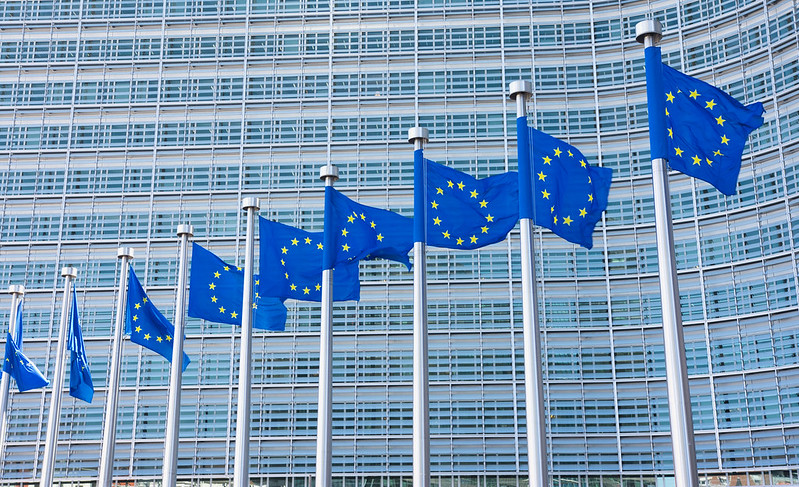Airbus, Eutelsat, SES, and Thales Make a Bid for EU’s Iris² Constellation

European Union flags outside of the EU headquarters Berlaymont building in Brussels, Belgium. Photo: Kyle Wagaman via Flickr, Creative Commons license
Some of the biggest players in Europe’s space industry are coming together to bid on the European Union’s Iris² constellation. A group of manufacturers and satellite operators — Airbus Defence and Space, Eutelsat, Hispasat, SES and Thales Alenia Space — announced Tuesday they will lead an open consortium to bid on the project.
A number of companies including telcos are identified as a “core team” — Deutsche Telekom, OHB, Orange, Hisdesat, Telespazio, and Thales. The consortium said it is looking for startups and other companies to participate in the project.
The Iris² constellation is a new flagship EU satellite project to provide sovereign, secure satellite connectivity to government users for security and defense and economic purposes, and to bridge the digital divide in Europe. In November, the EU committed 2.4 billion euros to the project, which will be Europe’s third space flagship program after Galileo and Copernicus.
Governments around the world are investing in space capabilities for security and defense purposes. For example, Australia recently awarded Lockheed Martin a prime contract to build the country a sovereign military satellite communications system, and the United Kingdom plans to build a multi-satellite system for surveillance and intelligence known as the Istari program.
The consortium said they will create a multi-orbit constellation that is interoperable with the terrestrial ecosystem. They will look at synergies between government and commercial infrastructures, and to provide commercial service to bridge the digital divide. These companies previously participated in a funded feasibility study for the project.
“The integrated team aims to foster collaboration among all European space players across the whole connectivity value chain with a view to enabling EU’s strategic autonomy through the delivery of sovereign, secure and resilient government services to protect European citizens,” the consortium said in a news release.
The EU shared a timeline for the project in an industry day in late March, outlining 2023 and 2024 as development and validation years. The constellation is set to be deployed from 2025 to 2027, with full services starting in late 2027.
Some funding for the project comes from the EU’s Govsatcom satcom resource pooling project, with the main IRIS² contract starting mid-2025. IRIS² will complement and integrate with Govsatcom.
The contract is expected to be valued at 6 billion euros over 12 years, with some funding from the EU, some from the European Space Agency (ESA), and private sources. The contract award will not be decided until early 2024.
“Iris² establishes space as a vector of our European autonomy, a vector of connectivity and a vector of resilience. It heightens Europe’s role as a true space power. With a clear ambition and sense of direction,” EU Commissioner Thierry Breton said in a statement about the constellation in November. “Space is indeed a much coveted area in which the European Union must guarantee its essential interests. And our space technologies have become strategic capabilities for our citizens, for the resilience of our economies and of course for our armies.”